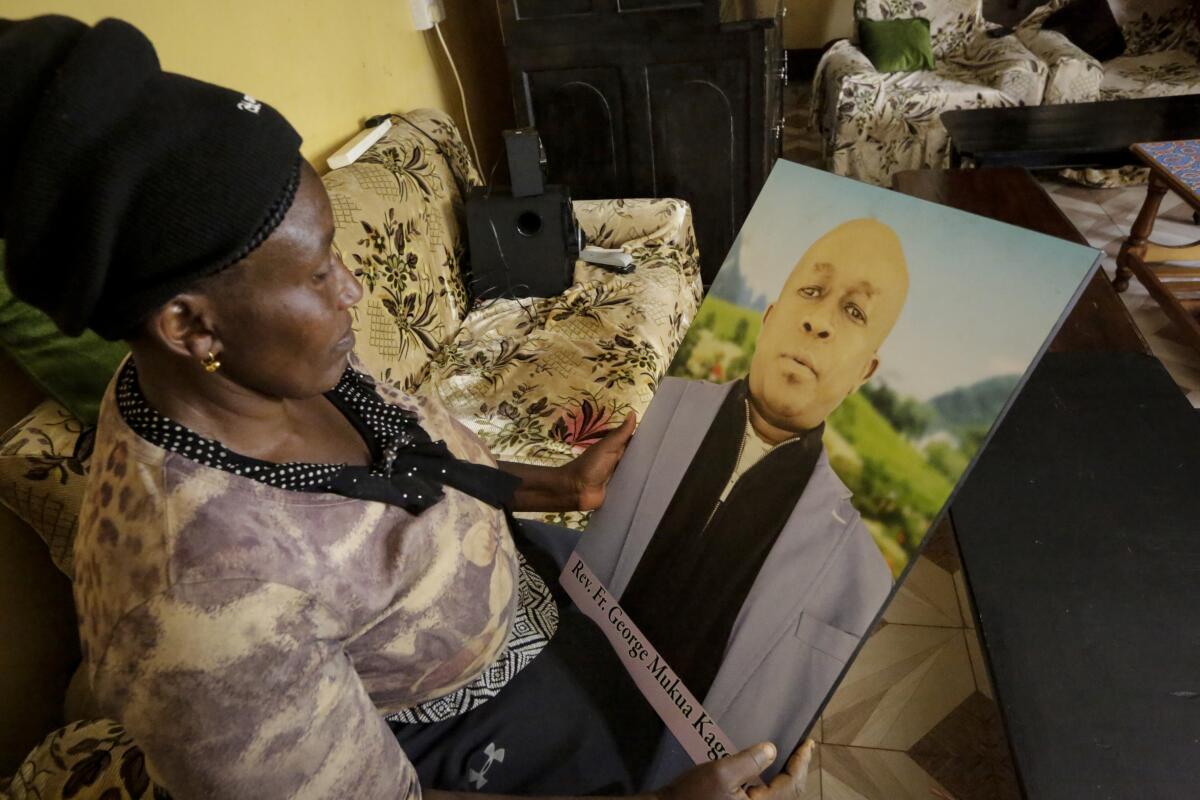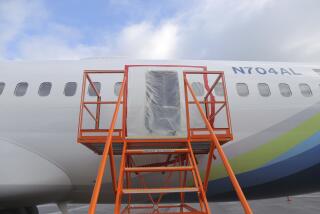Grief and controversy mark anniversary of Ethiopian plane crash

- Share via
ADDIS ABABA, Ethiopia — The year since the crash of an Ethiopian Airlines Boeing 737 Max has been a journey through grief, anger and determination for Ruth Kageche, Zipporah Kuria and others whose loved ones were on the plane.
Grief at the staggering toll: 157 lives lost when the plane crashed six minutes after takeoff.
Anger that the plane was flying at all, five months after another brand-new 737 Max crashed off the coast of Indonesia, killing 189 people.
And finally, determination to pressure Boeing and aviation regulators: If they were ever going to let the plane fly again, to make it as safe as possible, with pilots who were better informed and trained about the Max’s unique flight-control system.
The crash was not only devastating for the families of victims, it had far-reaching consequences for the aeronautics industry as it brought about the grounding of all Boeing 737 Max 8 and 9 jets, which remain out of service.
Flight 302 took off from Addis Ababa airport the morning of March 10, 2019. Almost immediately, the pilots reported problems with the plane and asked for permission to return to the airport. They never made it. After a struggle to control the plane, it nose-dived into a barren patch of land about 40 miles from Addis Ababa.
The flight was headed to Nairobi, and 32 of the passengers were Kenyan, the largest number of the 35 nationalities on board. The Rev. George Mukua Kageche, a Catholic priest, was among the passengers, returning home on his annual leave from Rome.
A year later his sister, Ruth Kageche, visited his grave on the family’s farm in Kenya where she buried what she said were the “fragments” of her brother returned to her — a hand, a few bits of flesh and bone and a piece of the priest’s robe he was wearing that morning.
Kageche said that since receiving the remains, neither she nor any family member has received any assistance or compensation from the airline or Boeing.
“Actually they called us to go for the fragments and from there, they just kept quiet,” said Kageche. “Now it’s the time they have started talking about the memorial.”
Families of the passengers have filed more than 100 lawsuits against Boeing. The Kageche family’s lawyer, Irungu Kang’ata, said “more and more evidence has been coming up that shows that Boeing had done something bad.” He pointed to messages and emails between Boeing employees including test pilots and production manager who had safety concerns about the Max, especially a flight-control system called MCAS that was not included on previous 737 models. These confessions, Kang’ata said, boost the victims’ cases.
The sharp pain of bereavement continues for Kageche and her family.
“We don’t think our hearts will ever heal and we need a lot of counseling to forget about these things,” she said, adding that professional help has not been offered to the family.
A private commemoration at the site of the crash for family members of victims has been planned by Ethiopian Airlines and Boeing. Family members from the United States, Canada and other parts of the world are being flown to Addis Ababa at Boeing’s expense for the memorial. Ethiopian officials did not plan to allow press coverage.
Zipporah Kuria, who lives in Britain, said she was appalled when family members got very little notice in November, and were unable to attend, when dozens of coffins bearing unidentified remains including those of her father, Joseph Waithaka, were buried in a mass grave. Photos circulated online of the coffins waiting to be covered, with a bulldozer and mounds of dirt in the background.
“They were buried as if they were people who didn’t have anyone who cared for them. They were robbed of their lives, and then they were robbed of their dignity,” she said. “We’re hoping that by coming together on the 10th where their remains now rest, we can begin to experience some form of closure.”
Kuria and her mother and two brothers plan to attend from the U.K.
In Canada, in suburban Toronto, Clariss Moore decided to go to Ethiopia for the memorial, but her husband, Chris, will stay home and visit a body of water, maybe a canal in Ottawa or a beach on Lake Ontario, to honor their daughter Danielle, a 24-year-old marine biologist who perished in the crash.
Chris Moore has already visited the site in Ethiopia and upon seeing it, realized the enormous impact of the crash. He took some comfort in knowing that his daughter must have died instantly. Now he is determined to continue to lobby Canadian and U.S. regulators to put the retooled Boeing Max under the toughest possible scrutiny. He is already looking ahead to a hearing later this month in Canada’s Parliament.
“I’m going through a constructive grieving process,” he said. “I’m trying to do something positive out of this — making something better, because March 10 was the worst day of my life.”
Nadia Milleron and Michael Stumo of Massachusetts, who lost their daughter Samya in the crash, are planning to attend the ceremony, along with Samya’s two brothers and her partner.
“I am definitely dreading the day,” Milleron said. “I have been there twice. I think about Samya approaching the ground and being alive — maybe I’m walking in a place where she was last alive.”
Milleron, however, has major reservations about the event. She said Boeing has been sensitive to the feelings of passengers’ families and will not have a major presence at Tuesday’s event, but Ethiopian Airlines has largely shut families out of planning the ceremony and a permanent memorial that will be built at the crash site.
“Ethiopian Airlines didn’t even want the memorial program,” she said. “In December, they said to us, ‘Why are you coming? You weren’t invited.’”
Now, she said, Ethiopian officials are fighting families’ requests to have Don Edkins, a South African documentary maker whose son Max died in the crash, film the event, and to consider a memorial design by Adrian Toole, a U.K. citizen whose daughter Joanna was also on the plane.
Relatives of the passengers say that Ethiopian Airlines has not shared all details about the ceremony, and it is unclear whether the airline’s CEO will speak.
“If he talks, the families won’t boo,” Milleron said. “They will just be quiet and be very upset.”
Kuria said the CEO should not speak, but she thinks both Ethiopian Airlines and Boeing have their own motives for organizing the event.
“We are under no illusion that the companies are doing this for us,” she said. “We are not oblivious to the fact that it’s also partially in service of themselves to repair their reputations.”
Family members like Kuria, Milleron, Stumo and the Moores say their year of grieving has been wrenching, but they are proud of raising questions about aviation safety and pressing for greater scrutiny of new planes.
One year after the crash, investigations are continuing. An official with the Ethiopian transport ministry said an interim report on the crash is expected to be released soon. “It is still being worked on. The plan it to release it ahead of the crash anniversary,” he told the Associated Press, on the condition of anonymity because he was not authorized to speak to the press.
Yonathan Menkir Kassa, an aviation writer based in Ethiopia’s capital, Addis Ababa, said the interim report on the crash is expected “anytime soon as early as next week.”
The Ethiopian crash came almost five months after a strikingly similar crash in Indonesia of the same model aircraft. Together the two crashes led to a grounding of all Boeing 737 Max jets, more than 380 planes used by more than 50 airlines around the world. Boeing initially expressed confidence that the planes would soon be returned to service, but no date has been set.
Ethiopian Airlines has had less disruption to its operations and in October announced it earned an operating profit of $260 million for the year, according to Yonathan. The investigation is being conducted in Ethiopia where there is not a strong independent media, human rights protection and transparent legal proceedings, he said.
Roland Rehhorn, whose daughter, Angela, died in the crash, traveled from Canada to Ethiopia for the memorial.
“Our memorial committee has done a pretty good job in getting information to us. But there were difficult moments trying to get information from Ethiopian Airlines and Boeing,” said Rehhorn.
“Looking back, I feel that this is a crash that could have been avoided. I think there were some oversights and hopefully moving forward those oversights will never happen again,” said Rehhorn. “I think we want the crash to be a memorial site but also we want the people around that area to have better opportunities, not just a memorial. We want to make sure that the local people have better opportunities, too.”
Meseret reported from Addis Ababa, Koenig from Dallas and Kaviti from Nairobi, Kenya.
More to Read
Sign up for Essential California
The most important California stories and recommendations in your inbox every morning.
You may occasionally receive promotional content from the Los Angeles Times.










